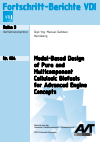Zusammenfassung
This thesis describes model-based strategies for the identification of pure and multicomponent cellulosic biofuels that exhibit tailored properties for use in high-efficiency, low-emission internal combustion engines. Based on the principles of computer-aided molecular design, algorithmic exploration of the molecular search space by means of carbon- and energy-efficient refunctionalization of bio-derived platform chemicals is combined with quantitative structure-property relationship (QSPR) and group contribution modeling of key physicochemical fuel properties including the derived cetane number. The resulting virtual fuel screening approach is applied to the task of identifying oxygenated fuel candidates for both spark-ignition and compression-ignition engines. Optimization-based formulation of 100%-renewable biofuel blends is performed by means of integrated product and pathway design. Application of the novel design methodology yields biofuel mixtures that exhibit both the desired p...
Schlagworte
Fuel Design Tailor-Made Biofuels Cetane Number Prediction Computer-Aided Molecular Design Targeted Molecular Structure Generation QSPR Modeling Group Contribution Modeling Optimization-Based Blend Design Integrated Product and Pathway Design- Kapitel Ausklappen | EinklappenSeiten
- 179–226 Appendices 179–226
- 227–276 Bibliography 227–276

